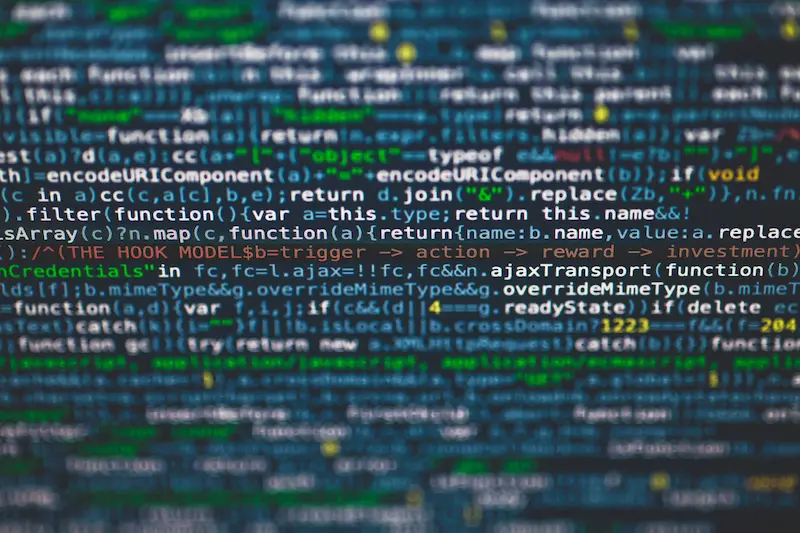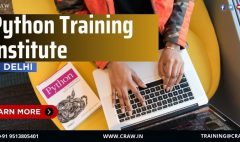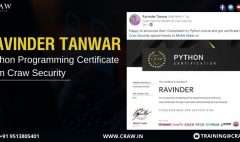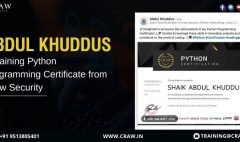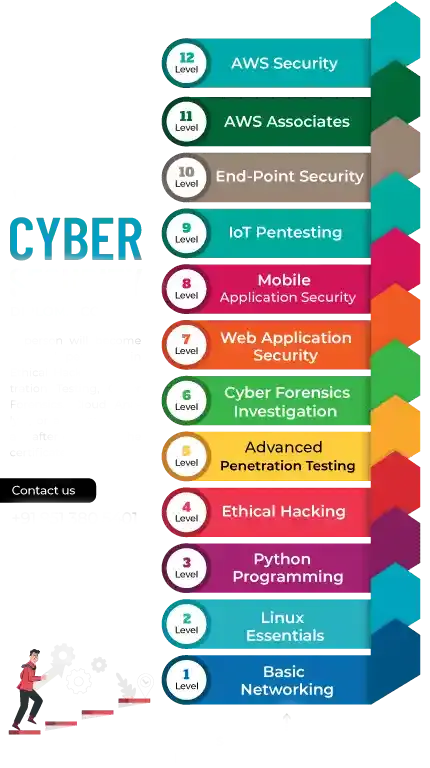A Detailed Guide to Python Courses with Placement

A Detailed Guide to Python Courses with Placement
Introduction: Guide to Python Courses with Placement
Python has become the undisputed leader in the large field of programming languages, encouraging creativity, streamlining problems, and overcoming gaps in technology. Python has evolved beyond its roots to become not simply a programming language but also a vital toolset for contemporary software development. It is a symbiotic blend of adaptability, simplicity, and strength.
Join us as we explore Python’s vast universe to learn why it is so popular and why companies from a variety of industries attest to its unrivaled prowess.
Python Courses: An Overview
Types of Python Courses
| Beginner Courses | These lessons cover the fundamentals of Python programming, including factors, data types, and simple I/O operations. Perfect for people without any or very little coding knowledge. |
| Intermediate Courses | Targeted at students who have a firm grasp of the fundamentals, intermediate courses go into more challenging subjects including object-oriented programming, basic file handling, and data structures (lists, tuples, dictionaries). |
| Advanced Courses | These courses, which are aimed at experienced Python developers, cover complex subjects including multithreading, networking, database management, and Python libraries particular to jobs like data analysis, web development, and AI. |
| Specialized Courses | These are classes that concentrate on particular uses of Python, like web development (using Django or Flask), data science (using Pandas and NumPy), machine learning (by employing TensorFlow or Scikit-learn), and more. |
| Certification Courses | These courses, which are geared toward experts, not only offer comprehensive instruction but also lead to a certification that attests to the learner’s proficiency with Python. |
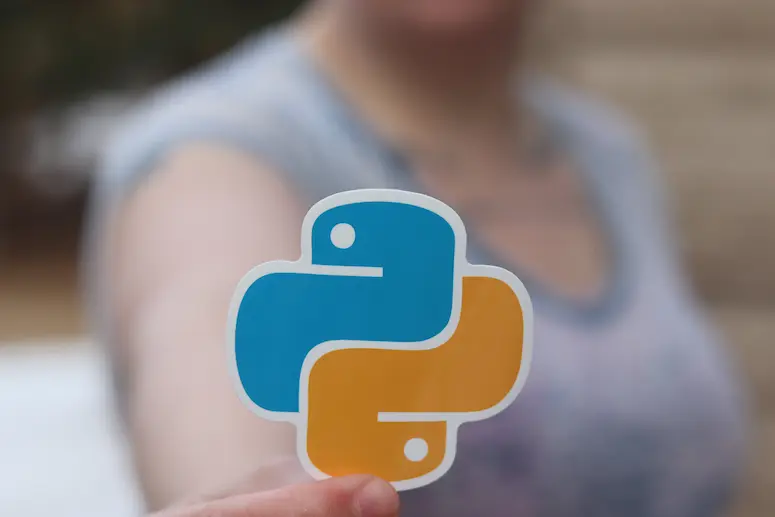
Key Learning Outcomes from Python Courses
- Fundamental Understanding: The fundamental ideas of Python programming, including its syntax, semantics, and distinctive characteristics, will become clear to learners.
- Problem-Solving Skills: Learners will acquire the skills necessary to approach and address real-world problems utilizing Python through practical exercises and projects.
- Mastery of Libraries and Frameworks: Participants will become familiar with key Python libraries and frameworks, depending on the course, preparing them to take on specific duties like web development, data analysis, or AI projects.
- Best Practices: A quality Python course teaches not only the how-to, but also the best practices, ensuring that students produce code that is clear, effective, and easy to maintain.
- Real-world Application: Learners will be equipped to use Python in a variety of business contexts, including task automation, data analysis, web development, and the creation of AI solutions.
Benefits of Learning Python
Why Learn Python: An Industry Perspective
- Versatility and Adaptability: Python is a flexible language that may be used for many different things, including data analysis, computer science, artificial intelligence, and web development. Python-skilled people in the sector are continually in demand thanks to its broad range of applications.
- Rapid Development Cycle: Python is a great language for quick prototyping and development, which is a trait that is highly desired in the rapid tech industry. It’s simple syntax and a large standard library makes it possible.
- Strong Community and Open Source Culture: Python has a sizable user base that regularly adds to its robust ecosystem of libraries and frameworks. As a result, Python is likely to have solutions for the majority of industrial requirements.
- Integration Capabilities: Python is favored by sectors that depend on legacy systems because it can easily interact with languages like C, C++, and Java.
- Growth in Data-Driven Fields: Python has seen a growth in demand as the fields of data science, machine learning, and artificial intelligence have grown in the market.
Career Paths after Learning Python
| Web Developer | Popular Python web development frameworks like Django and Flask let programmers build dependable and scalable web applications. |
| Data Scientist/Analyst | Learning how to use libraries like Pandas, NumPy, and Matplotlib will enable users to delve deeply into data, get new insights, and make decisions based on that data. |
| Machine Learning Engineer/AI Specialist | Python is a key language in AI and machine learning because of TensorFlow, Keras, and Scikit-learn. |
| Automation Engineer | Python is a great choice for building scripts and automating repetitive operations because of its simplicity, which creates roles that speed up business processes. |
| Network/Systems Administrator | Python is useful for positions in IT administration since it can be used to automate network configuration and manage system administration activities. |
| Game Developer | Beginning game developers can start their journey using libraries like Pygame. |
| Financial Analyst | Python is widely used in finance for activities, including risk management, quantitative analysis, and algorithmic trading due to its data processing skills. |
Python Courses with Placement: The Value-Added Proposition
The Placement Advantage
- Structured Pathway: A faster route from academic instruction to real-world implementation in the workplace is frequently offered through courses with placement opportunities, bridging the conceptual and practical demands of the workplace.
- Industry Connections: These programs frequently include ties to or relationships with various tech firms, which benefits students by exposing them to possible employers early on.
- Tailored Curriculum: These courses may tailor their curriculum to match what businesses are actually seeking due to information from the sector, assuring that learners are prepared for the workforce when they finish the program.
- Reduced Job Search Hassle: Finding a job can be challenging, especially for recent grads. This burden is reduced through a placement program, which offers tailored options immediately.
- Credibility Boost: Companies frequently have faith in colleges that provide placement services because they know the students through thorough training and screening, making them qualified candidates for a range of positions.
Role of Placements in Shaping Careers
| Early Exposure | Placements give students the ability to experience the workplace early on and become familiar with the realities and demands of the business world. |
| Building Professional Networks | Building significant professional networks when beginning a profession through placement can be very helpful for future changes and progress. |
| Direction to Career | Many people find that placements may give their careers a clear direction by placing them in jobs that match their abilities and goals. |
| Skill Validation | Gaining employment through placement is proof that the students’ knowledge and abilities from the course were put to use, which boosts their confidence. |
| Financial Stability | Starting a career right after finishing a course guarantees financial independence and stability, allowing people to make more solid plans for the future. |
Selecting the Right Python Course with Placement
Evaluating Course Curriculum
| Relevance to Industry | The curriculum should be in line with the requirements and norms of the market. Make sure the subjects addressed are those in which the industry actively wants knowledge. |
| Depth and Breadth | A quality Python course will cover all the fundamentals as well as dig in-depth into specialized subjects like AI, machine learning, and web development. |
| Hands-on Learning | Make sure the curriculum includes hands-on activities, projects, and actual situations. This practical method improves comprehension and equips students for tasks they will encounter on the job. |
| Up-to-date Content | The tech sector is always changing. Make sure the course material is periodically updated to reflect the newest Python developments and tools. |
| Reviews and Feedback | Potential learners should read reviews, testimonies, and comments from graduates or existing students before enrolling to obtain a sense of the course’s value. |
Placement Record and Partnerships with Companies
| Track Record | The course’s placement history is a crucial sign of its legitimacy. High placement rates typically indicate that students are benefiting and that the course’s excellence is acknowledged by the marketplace. |
| Company Tiers | Not every assignment is created equally. It’s helpful to consider the caliber of the businesses that have partnered with the course. Do any IT industry behemoths, upstarts, or specialized companies? This gives information on the variety of opportunities offered. |
| Diversity of Roles | Placement should focus on finding the right employment rather than merely getting a job. Look at the range of positions that former students have held to get a sense of the several career routes one might pursue following graduation. |
| Support System | Understanding the placement procedure is crucial. Does the school offer career counseling, résumé writing, and interview preparation? These extra services have a big impact on a student’s ability to get the job they want. |
| Long-term Partnerships | Long-standing, established relationships with businesses frequently imply a trust element. Reputable businesses hiring from the program year after year show that they have faith in the caliber of the graduates. |
Process of Enrolling in a Python Course with Placement
Steps to Enroll
There can be several steps to enroll in a genuine Python Course with Placement in a primetime Python Programming Training Institute in India, such as Craw Security, the Best Python Training Institute in India.
Here at Craw Security, you are just required to showcase a valid 12th-passed certificate duly recognized by a reputed board from anywhere in India.
Understanding the Application Process
| Eligibility Criteria | Make sure you meet the requirements for the course before applying. This might be based on prior educational credentials, coding experience, or even English language competency. |
| Deadlines | Make a note of the deadlines for applications so you won’t miss out. It’s wise to be aware that some institutions may provide early bird discounts or offer many rounds of application. |
| Recommendation Letters | Letters of recommendation from past professors or employers may be required for some courses. Make sure you purchase these early on. |
| Entrance Tests | A few colleges may need entrance exams to evaluate your fundamental skills or knowledge before allowing you to enroll. Prepare and try these if required. |
| Financial Considerations | Recognize the complete cost structure, from course enrollment to completion. Some organizations might provide payment options, early bird specials, or scholarships. |
| Feedback Mechanism | Talk to former or present students to receive frank opinions on the application procedure. Their perspectives could offer helpful advice or hints for completing the procedure quickly. |
Python Course: Key Components and Learning Approach
Learning the Basics: Syntax and Operations
| Introduction to Python | It’s crucial to comprehend Python’s background, design tenets, and unique selling points before starting to write any code. |
| Setting Up the Environment | Installing Python, configuring the integrated development environment (IDE), and getting acquainted with the Python shell are all part of this procedure. |
| Syntax Familiarity | Every language has grammatical rules, and Python is no different. Understanding indentation, variables, data types, and fundamental I/O operations are all part of this. |
| Operational Foundations | The basics of operations including arithmetic computations, string manipulation, and logical operations are introduced to students at this stage. |
| Control Structures | This part introduces students to conditional statements (if, else, elif), which are fundamental to any programming journey, and loops (for, while). |
| Hands-on Practice | Students should be encouraged to create tiny amounts of code at each stage to make sure they comprehend and can successfully apply the fundamental ideas. |

Diving Deeper: Data Structures, Libraries, and Frameworks
| Data Structures | As they delve further, students become familiar with Python’s built-in data structures, such as lists, tuples, dictionaries, and sets. This aids in effectively handling, conserving, and structuring data. |
| Functional Programming | Both the functional and object-oriented programming paradigms are supported by Python. Functions, lambdas, and understandings are a few of the subjects covered at this point. |
| Object-Oriented Programming (OOP) | The fundamentals of OOP in Python—classes, objects, inheritance, polymorphism, encapsulation, and abstraction—are covered in this section. |
| Python Libraries | Python’s robust ecosystem of libraries is one of its key strengths. Learners may be introduced to libraries like NumPy (numerical computations), Pandas (data manipulation), Matplotlib (data visualization), etc. depending on the course’s focus. |
| Frameworks | Python frameworks are essential for people drawn to web development or other specialized fields. Here, students can look into web programming frameworks like Django or Flask or machine learning frameworks like TensorFlow and Scikit-learn. |
| Real-world Projects | Practical application solidifies theoretical understanding. Students should work on projects where they use their knowledge of data structures, libraries, and frameworks to address issues in the real world. |
Preparing for Placement after Python Course
- Building a Portfolio
- Showcase Projects: Make a compilation of your best Python projects, making sure to include both simple and involved ones. This shows the range and depth of your abilities.
- Documentation: Give a brief explanation of each project’s goal, problems encountered, and solutions chosen. Code that is well-documented can say a lot about your professionalism and attention to detail.
- Use Version Control: Learn about GitHub and other platforms, as well as tools like Git. Regularly commit your code to show off your development methodology and capacity for change.
- Diversify: Strive to have assignments in a variety of fields, such as machine learning with TensorFlow, data analysis with Pandas, or web development employing Django or Flask. This wide spectrum suggests adaptability.
- Feedback and Refinement: Ask for advice from mentors or peers frequently, and improve on your work. A changing portfolio demonstrates ongoing learning.
- Presentation: Consider creating a personal website or blog where you may elaborate on your projects, share your experiences learning, or even offer tutorials. This strengthens your reputation and demonstrates your communication abilities.
- Preparing for Interviews
- Research the Company: Investigate the company’s key principles, offerings, and culture before the interview. Customizing your responses to fit the company’s ethos can make a strong first impression.
- Technical Preparation: Review the fundamentals of Python. Be ready for programming assessments or exercises involving data structures, algorithms, or practical difficulties.
- Soft Skills: Although technical knowledge is important, soft skills are also very important. Work on your interpersonal, collaborative, and problem-solving abilities.
- Mock Interviews: Practice job interviews by using online platforms, peers, or mentors. This lessens interview nervousness in addition to assisting with revising.
- Questions to Ask: You’ll get the ability to ask questions at the conclusion of the majority of interviews. Prepare well-thought-out questions about the team, business culture, or particular technologies they employ. This displays sincere curiosity.
- Behavioral Questions: Behavioral questions (such as “Tell me about a time when…”) are frequently included in interviews as a way to learn more about your prior conduct. Utilize the STAR (Situation, Task, Action, Result) approach to organize your responses as you think back on previous experiences.
- Stay Updated: The tech sector is always changing. Regularly review the most recent Python developments, popular libraries, or business news to demonstrate your dedication to lifelong learning.
Opportunities Post Python Course Completion
Job Roles and Industries
Several job roles and industries are there in which a person can work after completing a proficient Python Programming Course in India, like Craw Security’s world-class Python Programming Course, duly accredited by the FutureSkills Prime, a MeitY — NASSCOM, Digital Skilling Initiative, and approved by the Government of India.
Some of them are mentioned below:
- Software Developer/Engineer,
- Data Scientist/Analyst,
- Machine Learning Engineer,
- Web Developer,
- Systems Engineer/DevOps,
- Network Engineer,
- Game Developer,
- Industries, etc.
Expectations in terms of Salary
A heap of factors is responsible for judging the salary of a Python professional when it comes to evaluating a salary quotation. The mainstream factors as expectations in terms of salary are mentioned below:
- Entry-Level,
- Experience and Skill Set,
- Specializations,
- Geographical Factors,
- Company Size and Reputation, etc.
Continuous Learning and Growth in Python
Importance of Continuous Learning
| Rapidly Evolving Landscape | The field of technology is constantly evolving particularly programming. Best practices, new tools, and libraries are always being developed. Maintaining professional relevance and competitiveness requires continuous learning. |
| Deepening Expertise | Although fundamental knowledge provides a strong basis, mastery can only be achieved by delving deeper into particular fields, such as machine learning, web programming, or data visualization. |
| Career Advancement | Professionals who upgrade and broaden their skill sets put themselves in a position to take advantage of new possibilities, get promoted, or even move into more specialized areas. |
| Problem-solving Prowess | Continuous learning gives professionals access to a larger variety of approaches and tactics for solving difficult issues, improving their effectiveness and capacity for innovation. |
| Community Engagement | Being an engaged learner and contributing member of the Python community frequently go hand in hand. This involvement may result in partnerships, networking chances, and perhaps recognition within the larger Python ecosystem. |
Additional Resources for Further Learning
Numerous resources are there that offer many further learning opportunities, such as the following:
- Online Platforms,
- Books,
- Blogs and Websites,
- Podcasts,
- Conferences and Workshops,
- Open Source Contribution,
- Coding Challenges,
- Discussion Forums, etc.
Insights from Python Course Graduates
Interviews with Python Course Graduates
After interviewing several Python course graduates, you will certainly observe the following aspects:
- Diverse Experiences,
- Course Highlights,
- Challenges Faced,
- Mentorship and Peer Learning,
- Feedback on Curriculum,
How the Python Course and Placement Impacted Their Career
| Door Opener | Most people see the Python course as a catalyst that helped them get jobs they had previously thought were out of their reach. The training was crucial in helping students go from a non-tech background to a tech one or advance in their tech employment. |
| Placement Perks | The way that course placements facilitated their entry into the industry is commonly mentioned by those who benefited from them. They gained real-world experience far more quickly by working in established businesses or in startups shortly after finishing their courses. |
| Confidence Boost | The thoroughness of the training and the consequent placement gave students confidence in addition to technical understanding. Graduates felt more prepared to contribute to group initiatives and take on real-world issues. |
| Networking | The placements frequently connected graduates with professionals in the field, opening doors for future job opportunities, partnerships, and mentorship opportunities. This networking component is mentioned as a major career accelerator. |
| Continuous Learning | Many graduates claim that the program gave them a passion for lifelong study. While the course provided the groundwork, their internships exposed students to the newest business practices and trends, igniting a thirst for ongoing skill development. |
| Salary and Growth | Many graduates emphasize the practical advantages, pointing out that their earnings after the training and placement exceeded their prior salary. Additionally, the Python skills they learned enabled them to advance in their careers more quickly. |
FAQs
About A Detailed Guide to Python Courses with Placement
1: How long does it take to complete a Python course with placement?
Python Course in Delhi by Craw Security offers 40 hours of course duration to complete nicely.
2: What is the success rate of placements?
There is a narrow chance that you will get a placement just after doing Python Training in Delhi in this highly competitive world. Moreover, you can apply for a wholesome cybersecurity course or a Data Analyst Course with Python Programming so that you can some additional skills that will help you in obtaining international-standard techniques along with duly recognized certificates.
3: Can I manage the Python course with my existing job or education?
Yes, with our Online Python Course, you can nicely manage your self-paced learning approach while performing your day-to-day official chores.
4: Are there online Python courses with placement?
Yes, there are certain Python courses in the market that offer a placement with them. However, on the actual ground report, it is literally very tough to deliver the job placement with such a small amount of knowledge. However, a person can nicely grab a 1 Year Diploma in Cyber Security Course that comes with a 100% Placement Guarantee from Craw Security, the Best Cybersecurity Training Institute in India.
5: What is the average salary after completing the Python course with placement?
The entry-level Python developer earns around INR 3 lakh to 6 lahks per annum.
Conclusion
All in all, the experience of taking Python classes and the priceless benefits of placement serve as a powerful testament to the strength of this programming language and its extensive influence in the computer sector. Aspirants have been able to navigate the enormous Python environment, from its basic syntax to complex libraries and frameworks, by immersing themselves in structured Python classes. But the placement prospects that come with these courses are what really change the game. They not only provide a practical starting point for beginners, but they also improve the chances for individuals wishing to change directions or grow in their computer careers.
In addition to this, you may choose Craw Security, the Best Python Training Institute in India, which offers primetime Python courses at a very reasonable price that you could find nowhere else. All our Python batches are propagated by excelled mentors with years of excellence and experience in the same trajectory. Call +91-9513805401 to learn more about the upcoming Python Programming batches with our team of excellent educational counselors.


